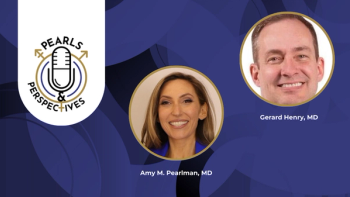
Dr. Dubin highlights stigma, education gaps in erectile dysfunction
"When they said that they value privacy over cost and convenience, I think that is the clearest sign that the stigma for men's health still exists," says Justin M. Dubin, MD.
In this video, Justin M. Dubin, MD, discusses findings from the study, “Beyond the prescription: trends and challenges in erectile dysfunction medications among young adult men,” for which he served as the senior author. Dubin is a urologist focused on men’s health at Memorial Healthcare System in South Florida.
Video Transcript:
I think the key here, when we're talking about the stigma of men's health, is when we ask these men how they chose their source of getting the medications. When they said that they value privacy over cost and convenience, I think that is the clearest sign that the stigma for men's health still exists. Guys don't want to come into an office and sit in an office where they can potentially be seen by other people, and almost announce, in their minds, that they're there because they have a problem. And if you're at a urologist specifically, it could be assumed it's probably an erection problem, a testosterone problem, especially as a younger guy. I think that's why primary care is often the first and the most common, because they're usually going there for a checkup of some sort, and they can ask the doctor in a more nonchalant and less stigmatized way.
That's why direct to consumer is so popular. It was the second most commonly used source for these medications, because it kind of does check all the boxes. You have privacy–pure anonymous. You can literally text someone in the company on your phone, you fill out a survey, you don't talk to anyone, and then you get it shipped to your house. It is incredibly convenient. You don't have to leave your house, you don't have to leave your office, you could do it from anywhere you want––the convenience of your home––and you get the medication right at home. Now, what I do tell patients, though, is that the cost is you're paying for that privacy and that convenience. Those medications at those companies sometimes are a little bit more expensive. I see guys who come in, and they're like, "Oh, wow, you can get it for that price?" I'm like, "Yeah, bud, but you just got to see me." So, I think that there is this huge stigma. Our study does highlight that stigma, where people are willing to pay more to not announce that they have a problem. And that's literally what's going on here.
In terms of education, our data did show that the majority of patients did receive counseling, 73%, on the risks and side effects of using the medications and that 84% had been given training on how to properly use the medication. But [only] 20% of medication users were able to correctly identify 4 components of how to properly use it. So, even though they were counseled, I think a lot of guys still don't really know how to use these medications. Often, especially when it comes to younger guys who I expect to have good erectile function, who come in, and say, "Hey, doc, listen. I've been here, I've been there, and I've tried an ED med, Viagra or Cialis, and it just doesn't work." The first question I have, and I know this is what other people in my field ask, is, "How did you take it? When did you take it?" And some people don't know. You're not educated on it. Some people stress because they're taking a medicine and it’s not working, and that's increasing stress, which can increase anxiety, which can increase erectile dysfunction at the end of the day. If you're taking Cialis or Viagra 10 minutes before you want to have sex, there is no way it's going to work, I don't care who you are. Education both in terms of normalizing and destigmatizing the conversations around men's health, which has significantly improved partially because of these direct-to-consumer companies, but partially because of everything that you we as urologists are starting to do both online, on social media, through the Urology Times, and things like that. But also, we need to make sure our patients are educated on medications and how to properly use them so that they're not fumbling around with these issues.
This transcription has been edited for clarity.
Newsletter
Stay current with the latest urology news and practice-changing insights — sign up now for the essential updates every urologist needs.






